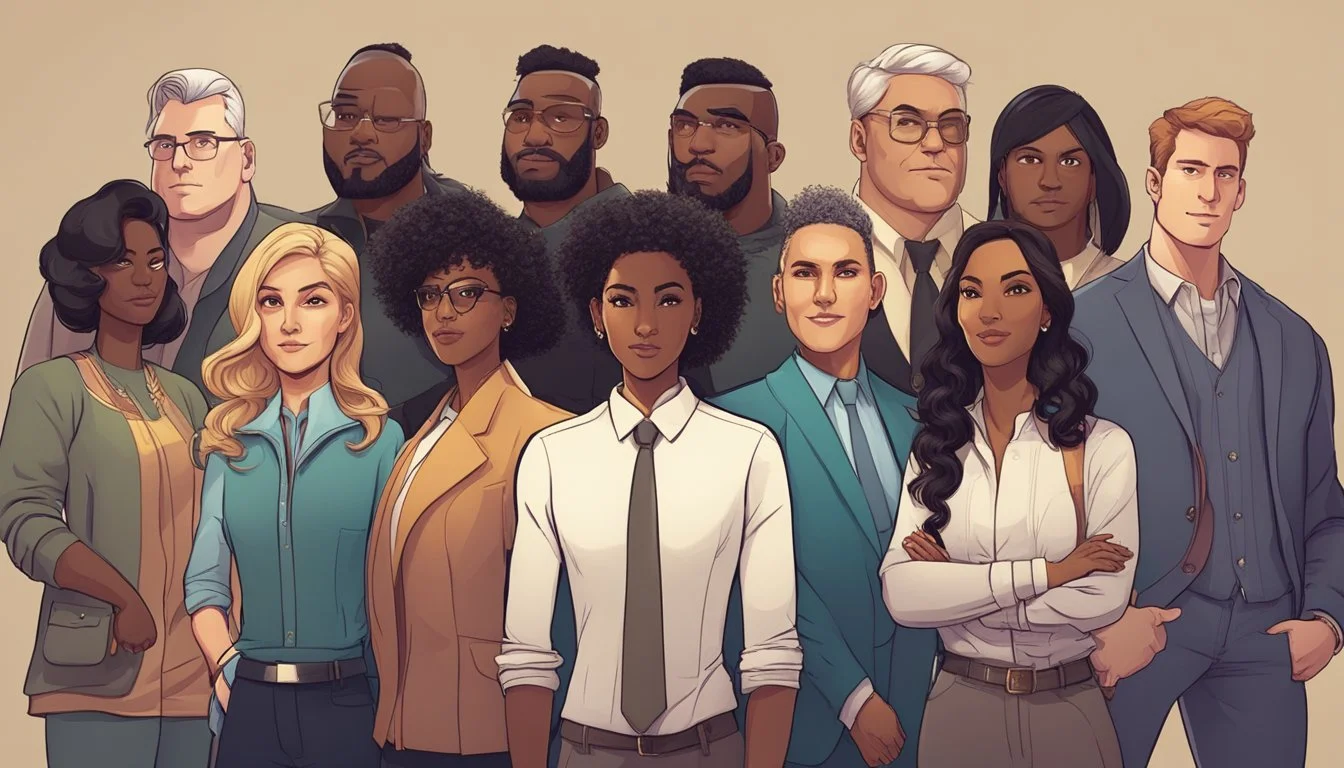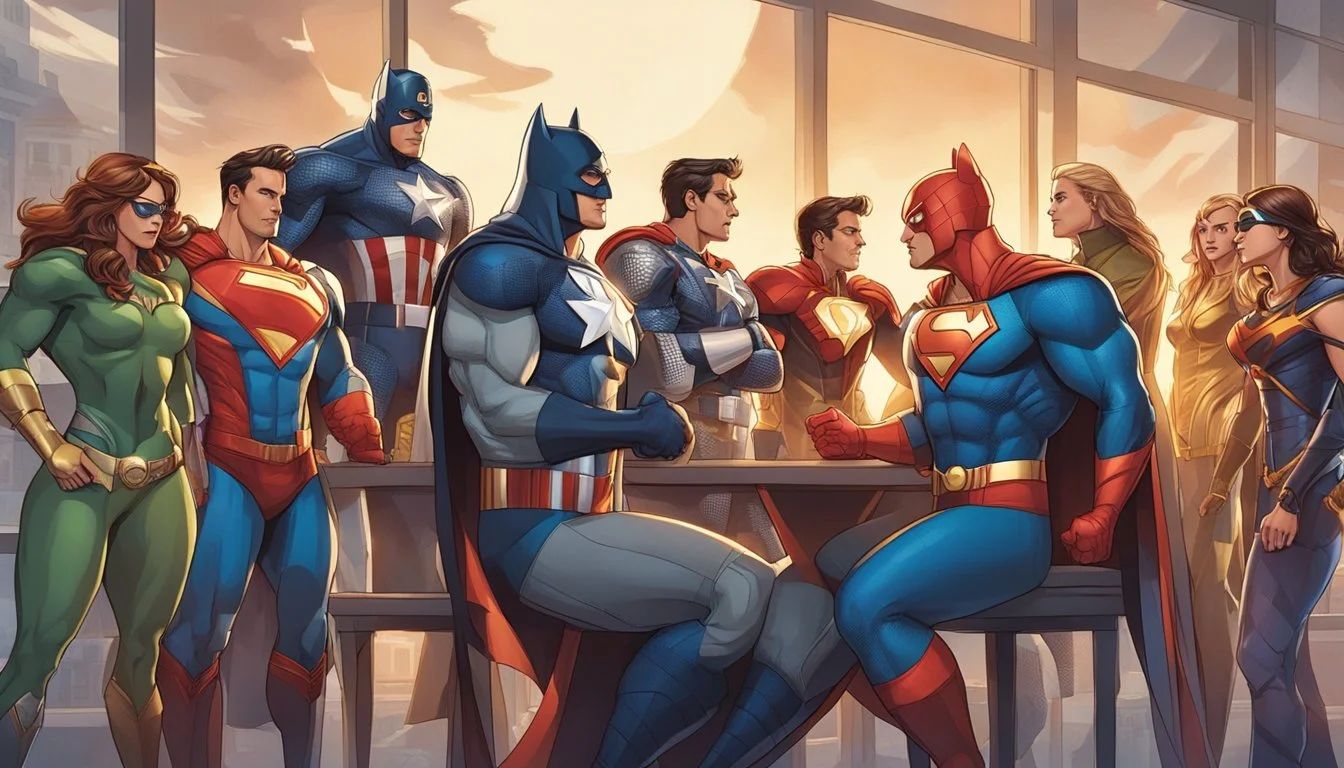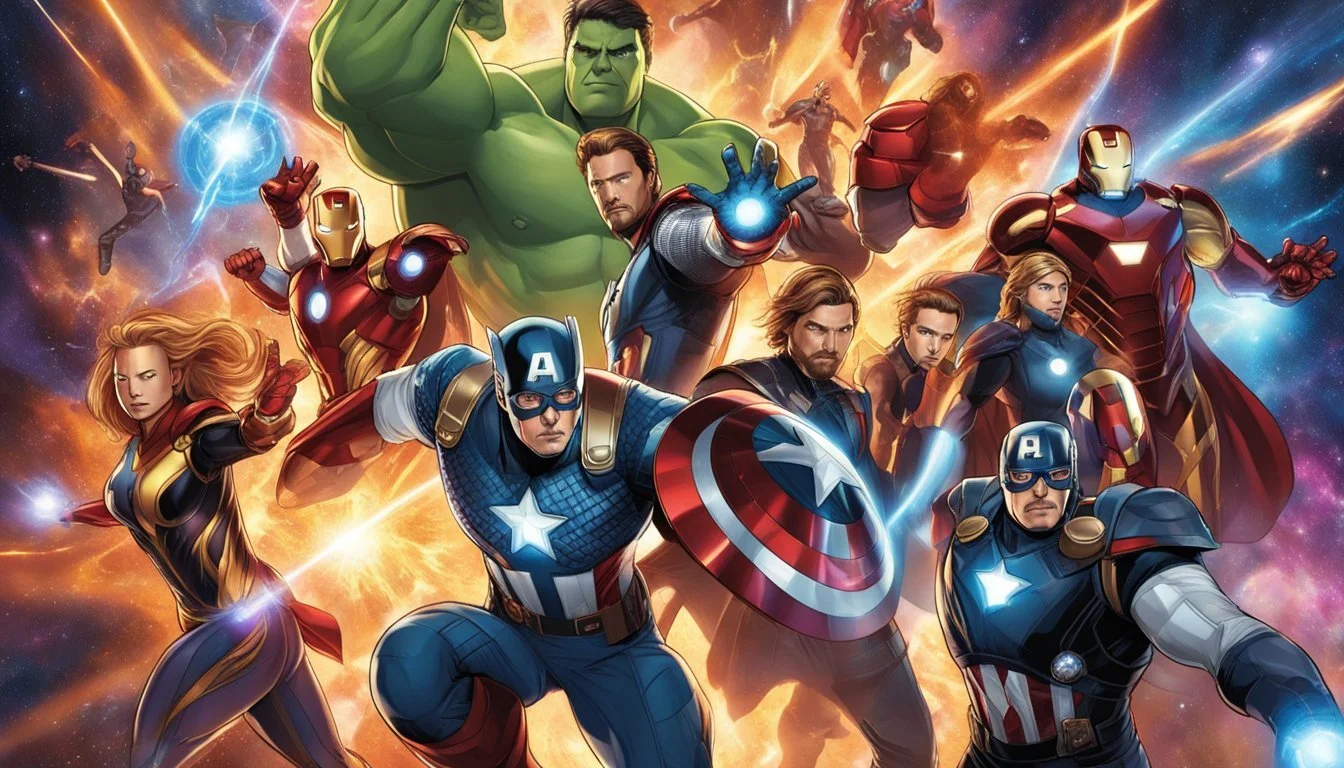Unpacking Avengers Personality Types: Discover the Heroes Behind the Masks
The Marvel Cinematic Universe has captivated audiences with its diverse cast of superheroes, each possessing unique personalities that resonate with viewers. The Avengers, Earth's mightiest heroes, showcase a range of character traits that can be analyzed through the lens of personality typing systems like the Myers-Briggs Type Indicator (MBTI).
Understanding the personality types of Avengers characters can provide insight into their motivations, strengths, and weaknesses. From the charismatic and extroverted Tony Stark to the introspective and principled Steve Rogers, each hero embodies distinct traits that contribute to their effectiveness as individuals and as a team.
Exploring these personality types offers fans a deeper connection to their favorite characters and sheds light on the dynamics within the Avengers. It also demonstrates how different personalities can come together to form a cohesive and powerful unit, capable of facing universe-threatening challenges.
Understanding Personality Typing
Personality typing offers insights into how individuals perceive the world and make decisions. It provides a framework for understanding different cognitive preferences and behavioral tendencies.
Basics of Myers-Briggs Type Indicator
The Myers-Briggs Type Indicator (MBTI) is a widely used personality assessment tool. It categorizes people into 16 distinct personality types based on four key dimensions.
These dimensions reflect preferences in how individuals process information and interact with their environment. The MBTI helps identify strengths, communication styles, and potential areas for personal growth.
Each type is represented by a four-letter code, such as INTJ or ESFP. This code summarizes an individual's preferences across the four dimensions.
Personality Dimensions - Introverted vs. Extroverted
The first MBTI dimension focuses on where individuals derive their energy and how they interact with the world.
Introverted (I) types tend to:
Recharge through solitary activities
Prefer deeper one-on-one conversations
Think before speaking
Feel drained by prolonged social interactions
Extroverted (E) types typically:
Gain energy from social interactions
Enjoy group activities and discussions
Think out loud
Seek out stimulating environments
This dimension influences how people approach social situations and manage their energy levels.
Sensing vs. Intuition
The second dimension relates to how individuals gather and process information.
Sensing (S) types:
Focus on concrete facts and details
Trust tangible, practical information
Prefer step-by-step instructions
Value real-world experiences
Intuitive (N) types:
Look for patterns and connections
Enjoy abstract concepts and theories
Prefer general guidelines over specifics
Value imagination and innovation
This preference affects learning styles, problem-solving approaches, and communication methods.
Thinking vs. Feeling
The third dimension explores how people make decisions and form judgments.
Thinking (T) types tend to:
Prioritize logic and objectivity
Analyze pros and cons
Seek fairness through equal treatment
Focus on tasks and goals
Feeling (F) types usually:
Consider personal values and emotions
Empathize with others' perspectives
Seek harmony in relationships
Focus on people and connections
This dimension influences decision-making processes and interpersonal dynamics.
Judging vs. Perceiving
The final dimension reflects how individuals approach structure and planning.
Judging (J) types prefer:
Clear plans and schedules
Organized environments
Making decisions quickly
Completing tasks before relaxing
Perceiving (P) types tend to:
Remain flexible and spontaneous
Adapt easily to changes
Keep options open
Mix work and play
This preference affects time management, work styles, and adaptability to new situations.
The Heroes of Marvel
Marvel's iconic superheroes have captured the imaginations of fans worldwide. These characters embody diverse personalities, powers, and origins, forming the backbone of the Marvel Universe and its most famous team, the Avengers.
Key Marvel Characters
Spider-Man, Iron Man, and Captain America stand out as some of Marvel's most recognizable heroes. Peter Parker balances his life as a teenager with his Spider-Man duties. Tony Stark, the genius billionaire, uses his high-tech armor as Iron Man. Steve Rogers, a World War II super-soldier, leads with unwavering moral conviction as Captain America.
Other crucial figures include Thor, the Asgardian god of thunder; Black Widow, the skilled spy; and Hulk, the gamma-irradiated powerhouse. Each brings unique abilities and perspectives to the team.
The Founding Avengers Members
The original Avengers team consisted of Iron Man, Thor, Hulk, Ant-Man, and Wasp. This group first assembled to face threats too big for any single hero. Captain America joined soon after, becoming a central figure and leader.
These founding members established the Avengers as Earth's mightiest heroes. Their diverse skill sets and personalities created a dynamic team capable of tackling global and cosmic threats alike.
Extended Avengers Team
As threats evolved, so did the Avengers roster. Key additions included:
Black Panther: Wakandan king and technological genius
Vision: An android with superhuman abilities
Scarlet Witch: Reality-warping mutant
Falcon: Skilled aerial combatant
These heroes expanded the team's capabilities and brought fresh perspectives. The rotating roster allowed the Avengers to adapt to new challenges and maintain their status as Earth's primary defenders.
Allies in the Marvel Universe
The Avengers often collaborate with other Marvel heroes and teams. The X-Men, led by Professor X, defend mutant rights while battling threats. The Fantastic Four explore cosmic mysteries. Doctor Strange protects Earth from mystical dangers.
Individual allies like Black Panther and Spider-Man frequently assist the Avengers. The Guardians of the Galaxy provide support for cosmic-level threats. These alliances strengthen the heroes' ability to protect the Marvel Universe from diverse and powerful adversaries.
Personality Profiles of Prominent Avengers
The Avengers team consists of diverse individuals with unique traits and abilities. Their distinct personalities shape their roles and dynamics within the group.
Captain America - The Duty Fulfiller
Steve Rogers embodies unwavering integrity and selfless dedication. His strong moral compass guides his actions, often putting the needs of others before his own.
Captain America's leadership style is rooted in his sense of duty and commitment to justice. He inspires his teammates through his bravery and principled approach to challenges.
Rogers excels at strategic planning and tactical decision-making. His military background and enhanced physical abilities make him a formidable force on the battlefield.
Despite being a man out of time, Steve adapts to modern situations while holding onto his core values. This blend of traditional ideals and flexibility makes him a respected figure among heroes and civilians alike.
Iron Man - The Visionary
Tony Stark's genius-level intellect and innovative thinking drive his contributions to the team. His quick wit and charm mask a complex personality shaped by past traumas and a desire to protect the world.
As Iron Man, Stark constantly pushes the boundaries of technology. His suits evolve with each appearance, showcasing his relentless pursuit of improvement and adaptation.
Tony's confidence borders on arrogance, but his actions often reveal a deep sense of responsibility. He grapples with the consequences of his creations and strives to use his wealth and intelligence for the greater good.
Stark's relationships with his fellow Avengers are multifaceted. He clashes with authority figures like Captain America but forms strong bonds with those who challenge him intellectually.
Thor - The Optimistic Leader
The God of Thunder brings a unique perspective to the Avengers as an Asgardian prince. Thor's jovial nature and warrior spirit lift team morale during difficult times.
Thor's character arc shows significant growth from an arrogant heir to a humble protector of Earth. His experiences teach him the value of humility and sacrifice.
As one of the most powerful Avengers, Thor often takes on formidable foes head-on. His combat skills combine centuries of experience with godlike strength and control over lightning.
Thor's optimism and belief in the inherent goodness of others make him a natural leader. He inspires loyalty and brings out the best in his teammates.
Hulk - The Complex Thinker
Bruce Banner's struggle with his alter ego, the Hulk, creates a unique dynamic within the team. His brilliant scientific mind contrasts sharply with the Hulk's raw power and primal emotions.
Banner's intellect rivals that of Tony Stark, particularly in the fields of gamma radiation and biochemistry. His contributions often come in the form of scientific solutions to complex problems.
The Hulk's unpredictable nature makes him both an asset and a liability in battle. Over time, Banner learns to harness the Hulk's strength while retaining more of his own consciousness.
Bruce's introverted personality and fear of losing control create challenges in his relationships with other team members. However, his compassion and desire to help others shine through in crucial moments.
Black Widow - The Strategist
Natasha Romanoff's background as a spy and assassin gives her a unique skill set among the Avengers. Her ability to read people and situations makes her invaluable in covert operations.
Black Widow's combat prowess compensates for her lack of superhuman abilities. Her agility, marksmanship, and tactical thinking allow her to hold her own against powerful adversaries.
Natasha's complex past and the red in her ledger drive her to seek redemption through her work with the Avengers. Her loyalty to the team becomes a cornerstone of her identity.
As one of the more pragmatic members, Black Widow often serves as a voice of reason. She balances the team's idealism with a grounded approach to problem-solving.
Hawkeye - The Practical Solver
Clint Barton's exceptional marksmanship and versatility make him a key asset to the Avengers. His ability to assess situations quickly and adapt his tactics proves crucial in many battles.
Hawkeye's down-to-earth personality and sense of humor provide a relatable presence among his superpowered teammates. He often acts as a grounding force for the group.
Clint's commitment to his family humanizes him and influences his decisions as an Avenger. This connection to a normal life gives him a unique perspective on the team's missions.
As a skilled tactician, Hawkeye excels at coordinating team efforts during complex operations. His experience and intuition complement the more specialized skills of his fellow Avengers.
Personality Types of Additional Superheroes
The Marvel Cinematic Universe features a diverse cast of superheroes, each with their own unique personality traits and characteristics. These individual qualities shape how they approach challenges and interact with others.
Wanda Maximoff - The Idealist
Wanda Maximoff, also known as Scarlet Witch, embodies the idealist archetype. Her INFP personality type drives her to seek deeper meaning and fight for what she believes is right.
Wanda's empathetic nature allows her to connect with others on an emotional level. This trait often influences her decision-making process.
Her idealism sometimes leads to internal conflicts, especially when faced with difficult choices that challenge her values. Wanda's powers are closely tied to her emotions, making her both formidable and vulnerable.
As an introvert, Wanda prefers smaller groups and meaningful connections. She often needs time alone to process her thoughts and feelings.
Ant-Man - The Resourceful Humorist
Scott Lang, aka Ant-Man, brings a lighthearted and adaptable energy to the superhero team. His ENTP personality type shines through in his quick wit and creative problem-solving skills.
Scott's humor serves as both a coping mechanism and a way to diffuse tense situations. He often uses jokes to connect with others and lighten the mood.
As a former thief, Scott's resourcefulness allows him to think outside the box. He frequently comes up with unconventional solutions to complex problems.
Scott's extroverted nature helps him build rapport with teammates and allies. His adaptability makes him valuable in unpredictable situations.
Black Panther - The Noble Strategist
T'Challa, the Black Panther, exemplifies the INTJ personality type. His strategic mind and strong sense of duty guide his actions as both a king and a superhero.
T'Challa's analytical approach allows him to assess situations quickly and make informed decisions. He often considers long-term consequences before acting.
As a leader, T'Challa balances tradition with innovation. He seeks to protect Wakanda while also sharing its resources with the world.
T'Challa's introverted nature manifests in his calm demeanor and preference for careful deliberation. He values loyalty and surrounds himself with trusted advisors.
Doctor Strange - The Independent Thinker
Stephen Strange embodies the INTP personality type. His analytical mind and pursuit of knowledge drive him to explore the mystical arts and push boundaries.
Strange's logical approach to problem-solving allows him to tackle complex magical and interdimensional challenges. He often sees patterns and connections others miss.
As a former surgeon, Strange brings precision and focus to his role as Sorcerer Supreme. He continuously seeks to expand his understanding of the mystical realm.
Strange's independence sometimes leads to conflicts with others. He may struggle with teamwork but recognizes its value in facing larger threats.
Comparative Analysis
The Avengers exhibit diverse personality types that shape their individual strengths and team dynamics. Their unique traits contribute to both similarities and differences in how they approach challenges and interact with one another.
Similarities Among Team Members
Many Avengers share a strong sense of loyalty and responsibility. These traits drive them to protect Earth and its inhabitants at great personal risk. Iron Man and Captain America, despite their differences, both demonstrate unwavering commitment to their mission.
Thor and Black Widow, though vastly different in background and abilities, show remarkable adaptability in unfamiliar situations. This flexibility allows them to work effectively across various team configurations.
Most team members also display high levels of courage and resilience. These qualities enable them to face overwhelming odds and persist through setbacks.
Variance in Personal Strengths
Each Avenger brings unique abilities to the team. Tony Stark's analytical mind and technological expertise contrast with Steve Rogers' tactical leadership and inspirational presence.
Natasha Romanoff's espionage skills and emotional intelligence complement Bruce Banner's scientific knowledge and raw power as the Hulk. These diverse strengths allow the team to tackle a wide range of threats.
Some heroes, like Hawkeye, excel in specialized areas such as marksmanship. Others, like Vision, offer more versatile capabilities. This variety ensures the team can respond effectively to different types of challenges.
How Personalities Influence Team Dynamics
The Avengers' diverse personalities significantly impact their interactions and effectiveness as a unit. Strong-willed members like Iron Man and Thor may clash over leadership decisions, leading to conflicts that can hinder teamwork.
However, these same personality differences often result in creative problem-solving. The combination of multiple perspectives allows the team to approach issues from various angles.
Empathetic team members like Black Widow often serve as mediators, helping to resolve conflicts and maintain group cohesion. Meanwhile, more reserved individuals like Bruce Banner may provide calm, rational input during heated moments.
The team's success often hinges on their ability to leverage these personality differences constructively, turning potential conflicts into strengths.
Broader Marvel Personality Typing
Marvel's diverse character roster extends far beyond the Avengers, offering a rich tapestry of personalities across various superhero teams and villains. These characters showcase a wide range of traits, motivations, and backstories that captivate audiences.
Guardians of the Galaxy - The Eccentric Crew
The Guardians of the Galaxy stand out as a ragtag group of misfits with unique personality quirks. Peter Quill, also known as Star-Lord, embodies the charismatic and impulsive leader archetype. His quick wit and love for 80s music define his persona.
Rocket Raccoon's sarcastic and tech-savvy nature contrasts with Groot's limited vocabulary but deep emotional intelligence. Gamora's stoic exterior masks her internal struggle for redemption, while Drax's literal-mindedness often leads to comedic misunderstandings.
This eclectic mix of personalities creates a dynamic team that thrives on their differences, making them an unpredictable force in the Marvel universe.
Mutants of X-Men - The Diverse Outcasts
The X-Men represent a spectrum of personalities united by their shared mutant status. Charles Xavier's calm and diplomatic nature serves as the foundation for the team, while Magneto's intense and sometimes ruthless approach offers a stark contrast.
Wolverine's gruff exterior and inner turmoil make him a complex character, often at odds with Cyclops' more structured and leadership-oriented personality. Jean Grey's empathetic nature and immense psychic powers add depth to team dynamics.
Storm's regal demeanor and weather-controlling abilities reflect her strong leadership qualities. These diverse personalities, shaped by their experiences as mutants, create a rich tapestry of interactions within the X-Men universe.
The Villains' Persona
Marvel villains exhibit a range of intriguing personality types that often mirror or contrast with the heroes they face. Ultron's cold, logical approach to achieving his goals stems from his artificial intelligence origins.
Thanos displays a complex personality, combining ruthless determination with a twisted sense of altruism in his quest for universal balance. Loki's mischievous nature and desire for power are tempered by moments of vulnerability and familial conflict.
Magneto, while often portrayed as an antagonist, showcases a nuanced personality driven by his experiences and desire to protect mutantkind. These multi-dimensional villains add depth to the Marvel universe, challenging heroes on both physical and ideological fronts.
Personality Typing: Myths vs. Reality
Personality typing systems like the Myers-Briggs Type Indicator (MBTI) are popular yet often misunderstood. Examining common misconceptions and their application to fictional characters can provide clarity on the strengths and limitations of these frameworks.
Common Misconceptions
Many believe personality types are fixed and unchanging. In reality, individuals may display traits from multiple types. The MBTI is a tool for self-reflection, not a definitive label.
Some view certain types as superior to others. Each type has unique strengths and challenges, with no inherently "better" personality.
Another myth is that personality typing can predict behavior with certainty. While it offers insights, human complexity means actions aren't always predictable based solely on type.
Applying Personality Types to Fiction
Fictional characters often embody exaggerated personality traits, making them interesting subjects for typing. The Avengers provide diverse examples:
Tony Stark (Iron Man): Often typed as ENTP, showcasing innovation and charisma
Steve Rogers (Captain America): Frequently seen as ISFJ, embodying loyalty and duty
Natasha Romanoff (Black Widow): Commonly typed as ISTP, displaying adaptability and tactical thinking
These classifications can enhance character analysis but shouldn't be treated as absolute. Writers create nuanced characters that may not perfectly fit into specific types.



